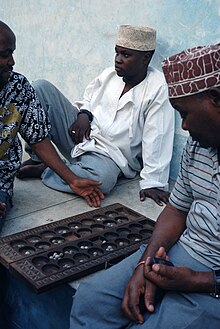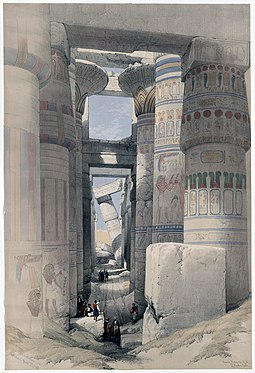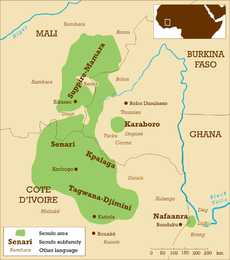Portal:Africa



Africa is the world's second-largest and second-most populous continent after Asia. At about 30.3 million km2 (11.7 million square miles) including adjacent islands, it covers 20% of Earth's land area and 6% of its total surface area. With nearly 1.4 billion people as of 2021, it accounts for about 18% of the world's human population. Africa's population is the youngest among all the continents; the median age in 2012 was 19.7, when the worldwide median age was 30.4. Based on 2024 projections, Africa's population will reach 3.8 billion people by 2099. Africa is the least wealthy inhabited continent per capita and second-least wealthy by total wealth, ahead of Oceania. Scholars have attributed this to different factors including geography, climate, corruption, colonialism, the Cold War, and neocolonialism. Despite this low concentration of wealth, recent economic expansion and a large and young population make Africa an important economic market in the broader global context. Africa has a large quantity of natural resources and food resources, including diamonds, sugar, salt, gold, iron, cobalt, uranium, copper, bauxite, silver, petroleum, natural gas, cocoa beans, and.
Africa straddles the equator and the prime meridian. It is the only continent to stretch from the northern temperate to the southern temperate zones. The majority of the continent and its countries are in the Northern Hemisphere, with a substantial portion and a number of countries in the Southern Hemisphere. Most of the continent lies in the tropics, except for a large part of Western Sahara, Algeria, Libya and Egypt, the northern tip of Mauritania, and the entire territories of Morocco, Ceuta, Melilla, and Tunisia, which in turn are located above the tropic of Cancer, in the northern temperate zone. In the other extreme of the continent, southern Namibia, southern Botswana, great parts of South Africa, the entire territories of Lesotho and Eswatini and the southern tips of Mozambique and Madagascar are located below the tropic of Capricorn, in the southern temperate zone.
Africa is highly biodiverse; it is the continent with the largest number of megafauna species, as it was least affected by the extinction of the Pleistocene megafauna. However, Africa also is heavily affected by a wide range of environmental issues, including desertification, deforestation, water scarcity, and pollution. These entrenched environmental concerns are expected to worsen as climate change impacts Africa. The UN Intergovernmental Panel on Climate Change has identified Africa as the continent most vulnerable to climate change.
The history of Africa is long, complex, and varied, and has often been under-appreciated by the global historical community. In African societies the oral word is revered, and they have generally recorded their history via oral tradition, which has led anthropologists to term them oral civilisations, contrasted with literate civilisations which pride the written word. During the colonial period, oral sources were deprecated by European historians, which gave them the impression Africa had no recorded history. African historiography became organized at the academic level in the mid-20th century, and saw a movement towards utilising oral sources in a multidisciplinary approach, culminating in the General History of Africa, edited by specialists from across the continent. (Full article...)
Selected article –

Swahili culture is the culture of the Swahili people inhabiting the Swahili coast. This littoral area encompasses Tanzania, Kenya, and Mozambique, as well as the adjacent islands of Zanzibar and Comoros along with some parts of Malawi and the eastern part of Democratic Republic of Congo. Swahili people speak Swahili as their native language, which belongs to the Bantu language family. Graham Connah described Swahili culture as at least partially urban, mercantile, and literate.
Swahili culture is the product of the history of the coastal part of the African Great Lakes region. As with the Swahili language, Swahili culture has a Bantu core that has borrowed from foreign influences. (Full article...)
Featured pictures –
Did you know (auto-generated) -

- ... that despite the support of the British authorities, the multi-racial United Tanganyika Party was unsuccessful, with the African-nationalist TANU winning a majority in the 1958–59 election?
- ... that in the 1880s Joseph T. Wilson wrote the "most comprehensive study of African American military service" of the era?
- ... that Freetown, Alabama, was founded by free and formerly enslaved African Americans in Alabama, whose church, built in 1929, burned down in 2022?
- ... that South African mayor Marlene van Staden was re-elected through a coin toss?
- ... that Albert Luthuli was the first African to win the Nobel Peace Prize?
- ... that ten years after publishing the book Great South African Christians, Horton Davies gave a speech criticizing South African churches and synagogues for their role in apartheid?
Categories
Selected biography –
Jean Verdi Salomon Razakandraina (1913–1978), commonly known as Dox, was a Malagasy writer and poet considered one of the most important literary figures in the country's history. He is principally renowned for his poetry and plays, but was also a painter, wrote and performed musical compositions, and translated several major French and English language works into Malagasy. His works have formed part of the language arts curriculum in Madagascar at every grade level since the country regained independence in 1960.
Dox began writing in 1930 while studying at a fine arts school in Antananarivo, where fellow students gave him the nickname "Dox". In 1932, after briefly conceding to his father's wish that he study medicine, Dox dedicated himself fully to the arts and joined with other notable Malagasy poets in advancing the Mitady ny very movement ("search for lost values"), launched by Jean-Joseph Rabearivelo, Charles Rajoelisolo and Ny Avana Ramanantoanina. His work during this period reflected the movement's aim to reaffirm the value of Malagasy identity, which had been eroded under the influence of the French colonial administration. In 1941, he printed his first collection of poems, Ny Hirako, which was written in the Malagasy language. When a major nationalist uprising erupted in 1947, Dox rallied behind the Mouvement démocratique de la rénovation malgache and suffered a gunshot wound during a protest. He also actively took part in the student protests of 1972 that brought down the Tsiranana administration. In 1971 he published his only compilation of French language poems, Chants Capricorniens. Throughout his career, he produced nine poem anthologies, numerous books in prose, and sixteen plays featuring folk tales, Biblical stories or Malagasy historical themes, in addition to countless privately commissioned works. (Full article...)
Selected country –
 |
 |
|

| ||
Morocco, officially the Kingdom of Morocco (Arabic: المملكة المغربية), is a country in North Africa. It has a coast on the Atlantic Ocean that reaches past the Strait of Gibraltar into the Mediterranean Sea. Morocco has international borders with Algeria to the east, Spain to the north (a water border through the Strait and land borders with two small Spanish autonomous cities, Ceuta and Melilla), and Mauritania to the south.
The full Arabic name Al-Mamlaka al-Maghribiya translates to "The Western Kingdom." Al-Maghrib (meaning "The West") is commonly used. The Latinized name "Morocco" originates from medieval Latin "Morroch," which referred to the name of the former Almoravid and Almohad capital, Marrakech.
Morocco is a de jure constitutional monarchy. The King of Morocco, with vast executive powers, can dissolve the government and deploy the military, among other prerogatives. Opposition political parties are legal, and several have been formed in recent years. (Read more...)
Selected city –
Omdurman (Arabic: أم درمان, romanized: Umm Durmān) is a major city in Sudan. It is the second most populous city in the country, located in the State of Khartoum. Omdurman lies on the west bank of the River Nile, opposite and northwest of the capital city of Khartoum. It is on the Nile river and acts as an important road hub, with the Nile boosting transportation even further. (Full article...)
In the news
- 12 February 2024 –
- Two boats collide on the Congo River near Kinshasa, Democratic Republic of the Congo; with the death toll remains unclear. (AP)
- 11 February 2024 – 2023 Africa Cup of Nations
- In association football, hosts Ivory Coast win their third Africa Cup of Nations by defeating Nigeria 2–1 in the final. Sébastien Haller scores the winning goal in the 81st minute. (The Guardian)
- 10 February 2024 – Somali civil war
- Four Emirati soldiers and a Bahraini military officer are killed, while ten other people are injured, when a soldier opens fire at a military base in Mogadishu, Somalia, before being killed in the ensuing shootout. Al-Shabaab claims responsibility. (AP)
- 10 February 2024 –
- A Eurocopter EC130 helicopter crashes near Nipton, California, United States, killing all the six people on board, including Nigerian banker Herbert Wigwe. (CBS News)
- 10 February 2024 – 2023–2024 Senegalese protests
- Violent protests occur in Senegal following an announcement by President Macky Sall that presidential elections have been delayed from February 25 to December 15. (Sky News)
- 9 February 2024 –
- At least 18 people are killed during a collision between a bus and a truck on a road in Kinshasa, Democratic Republic of the Congo. (AP)
Updated: 16:33, 14 February 2024
General images -
Africa topics
More did you know –
- ...that members of the Senegalese rap group Daara J were hired by campaigners in the Senegalese election of 2000 to edit their speeches?
- ...that Senegalese hip hop group Positive Black Soul's name abbreviation, PBS, is a play on that of the Parti Démocratique Sénégalais, PDS?
- ...that Mamadou Diabaté, a Malian kora player, was nominated for a Grammy Award in 2005, but lost to his cousin Toumani Diabaté?
- ...that, in November 2007, The Sowetan published an article which erroneously claimed that South African political activist Dan Mokonyane had died?
Related portals
Major Religions in Africa
North Africa
West Africa
Central Africa
East Africa
Southern Africa
Associated Wikimedia
The following Wikimedia Foundation sister projects provide more on this subject:
-
Commons
Free media repository -
Wikibooks
Free textbooks and manuals -
Wikidata
Free knowledge base -
Wikinews
Free-content news -
Wikiquote
Collection of quotations -
Wikisource
Free-content library -
Wikispecies
Directory of species -
Wikiversity
Free learning tools -
Wikivoyage
Free travel guide -
Wiktionary
Dictionary and thesaurus























































































